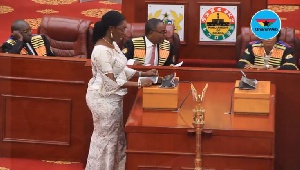The Minister for Communications, Ursula Owusu-Ekuful, has defended the $89.4million contract awarded Kelni-GVG by the government of Ghana, saying attempts to impugn the integrity of the contract will not wash, stating emphatically that the uneasiness surrounding the Kelni Global Voice Group (GVG) deal was totally unnecessary.
She indicated that the government is determined and stand resolute to go ahead with the contract despite the growing oppositions to it, saying “We will not waver or relent in this.”
Ursula Owusu-Ekuful yesterday, Thursday May 31, 2018, appeared before the Parliament of Ghana to answer questions concerning the controversial Kelni GVG deal signed between the Government of Ghana and Haitian firm Kelni GVG.
It could be recalled that the Minority in Parliament claimed the contract is “pure theft”, but the Communication Minister said “nothing could be far from the truth” and that the government through the Communication Ministry is acting in the interest of Ghanaians to “safeguard revenues that ought to accrue to the state.”
She said: “Mr. Speaker, there have been absolutely no corruption or underhand dealings in this transaction. I can never be party to any such conduct as I value my reputation and the reputation of the government which serves the good people of Ghana. I stand here as a Minister of the Akufo-Addo administration to assure this august house that I believe this is the best deal we could have got.”
Mr. Owusu-Ekuful also rubbished claims that Kelni-GVG is not credible stating that, “As far back as 2009, National Security conducted extensive due diligence on GVG and confirmed the credibility and technical capacity of the company in writing (ref:NSCS40/V.10/1231 of 28th April 2009).”
Rubbishing IMANI Africa’s position that the Kelni-GVG was awarded a contract by the Akufo-Addo administration for design, development and implementation of a common platform for traffic monitoring, revenue assurance, and mobile money monitoring and fraud management—a service already being rendered by Afriwave and Subah Info Solution, Ursula Owusu- Ekuful said the contract is not a duplication of any existing contract and that “No other system or company is currently providing this service. The mobile money interoperability platform of GHIPPs monitors transactions between two or more Telcos and the banks but does not monitor transactions on one network. The CMP does so.”
She told members of Parliament that the National Communications Authority (NCA) contracted the services of GVG in 2009 to monitor the Inbound International Traffic to ensure government received the required tax revenues, adding that GVG was also required to manage fraud on the network to reduce the incidence of traffic bypass (SIM Box) since that also had an adverse impact on Government revenues.
He said, “There was strident opposition to this move by the GOG, spearheaded by the mobile network operators which resulted in several lawsuits. They cited security of their network installations and privacy concerns primarily, but their main motivation may have been their unwillingness for GOG to have full visibility of their actual traffic volumes to determine the real taxes payable on the revenues earned from them.”
The MP for Ablekuma West Constituency also averred that following sustained pressure, GVG was compelled to terminate their operations in Ghana a year before their contract expired and the contract was taken over by Subah Infosolutions Limited in 2012.”
According to her, the GRA also engaged Subah to perform domestic traffic monitoring though it had no previous experience in telecoms revenue assurance, explaining that, “After Subah took over the GVG Contract, they continued to monitor both Local and Inbound International Traffic for the National Communications Authority and Ghana Revenue Authority.”
The minister pointed out that this was not on real time basis, as data was only collected from the servers of the Mobile Network Operators. She said the network operators persisted in denying these companies the right to connect to their physical network nodes to collect the raw data for analysis.
“Mr. Speaker, in 2016, a further complication was introduced. The Electronic Communications Act was amended (Act 910) to make interconnection through an Interconnect Clearinghouse (ICH) mandatory. The Electronic Communications (Interconnect) Clearinghouse Service Regulation, 2016 specifically barred any ICH from providing revenue assurance services. Afriwave Ghana Limited was granted a licence to provide Interconnect Clearinghouse Services in August 2016 but Mr. Speaker, the scope of the Afriwave License included Monitoring of International Incoming Traffic and Anti-Fraud Monitoring (SIM-BOX Tracking). This was not a core function of the ICH. The introduction of Afriwave meant that there would have been a duplication of efforts as Subah continued to provide Inbound International Traffic Monitoring Services to the NCA.”
She added that in order to avoid this clear duplication, the NCA wrote on a number of occasions to inform Subah Infosolutions that their services were no longer required by the NC and when Subah ignored those letters it became pertinent that while the NCA was not a party to the Subah contract which was between Subah and the GRA, it was bound to use their services even where it did not need or require it and was obliged to pay for it.
She also revealed that neither Subah nor Afriwave was collecting real time data from any operator since it was unanimously agreed that the provisions of Act 864 would be implemented to the letter.
“The NCA would be the technical body to acquire and implement a Common Platform, working with the GRA under the direction of the Ministers for Finance and Communications for a successful implementation. It was envisaged that the entire process would conclude with the Common Platform being established by the end of 2017. Subsequently, the Ministry of Communications, in consultation with the Ministry of Finance, issued written policy directives to the NCA to proceed accordingly.”
She therefore made a case that the Common Platform is necessary for monitoring International and domestic voice and data traffic, volumes, revenue, and mobile money transactions in an independent way.
Real-time electronic traffic monitoring combined with batch files from the MNOs is the only means by which government revenues in the telecoms industry can be accurately monitored by comparing different sources of information with each other, she said.
“Mr. Speaker, there has been absolutely no corruption or underhand dealings in this transaction. I can never be party to any such conduct as I value my reputation and the reputation of the government which serves the good people of Ghana. I stand here as a Minister of the Akufo-Addo administration to assure this august house that I believe this is the best deal we could have got,” she stressed. And announced that Vodafone and Glo are currently in the process of connecting physically to the Common Platform (CMP).
Kelni GVG
Kelni GVG, a Haitian originated company, was awarded a contract by the government for design, development and implementation of a common platform for traffic monitoring, revenue assurance, and mobile money monitoring and fraud management, a service already being rendered by Afriwave and Subah Info Solution.
IMANI African has however questioned the rationale behind the new contract with Kelni GVG, describing it as wasteful and aimed at milking the public purse. According to the policy think tank group, reasons espoused by government officials to back the deal lack financial sense except that it was premised on political thinking.
Although government insists the deal saves the country $1.1 million a month, Franklin Cudjoe wonders why the state has been paying the firm $1.5 million per month since January for “no work done”. To him, the deal is “needless” and a rip-off.

















